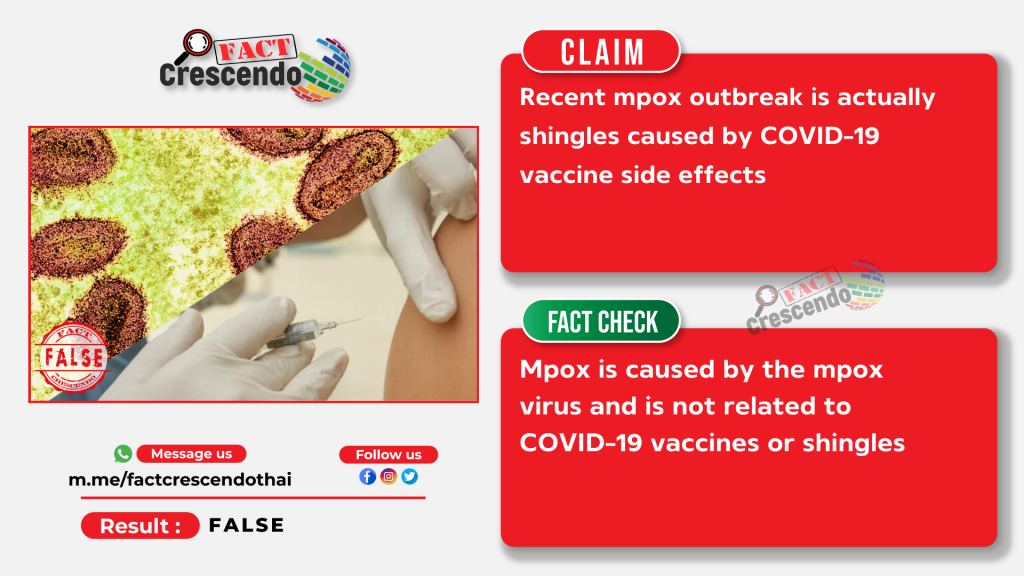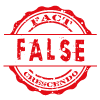
Mpox, formerly known as monkeypox, has become a global health concern. On August 14, 2024, WHO Director-General Dr. Tedros Adhanom Ghebreyesus declared the mpox outbreak a Public Health Emergency of International Concern (PHEIC). This decision was prompted by the rapid increase in cases, especially in the Democratic Republic of the Congo and other African nations, necessitating an urgent international response. The declaration emphasizes the critical nature of the situation and the need for global action. (Source: WHO)
Amid this alarming situation, a claim has gone viral on online platforms suggesting that the latest mpox outbreak is actually shingles caused by the COVID-19 vaccine.
Social Media Claims
Recently, multiple social media users have claimed that the mpox virus, formerly known as monkeypox, is actually shingles caused by side effects of the COVID-19 vaccine.
Fact-Check
Clarification from the WHO
The Fact Crescendo team contacted the World Health Organization (WHO)’s office in Thailand regarding this matter. The WHO office clarified that:
“The recent cases of Mpox are not caused by shingles or side effects of the COVID-19 vaccine. Mpox is a viral illness caused by the monkeypox virus, a species of the genus Orthopoxvirus. Two different clades exist: clade I and clade II. For more information on Mpox, the WHO recommends referring to their official website.“
Here is detailed information on Mpox provided by WHO: Mpox Fact Sheet and WHO Public Advice on Mpox.
Differences Between Mpox and Shingles
Mpox and shingles are caused by different viruses and have distinct clinical presentations.
Though both mpox and shingles are viral infections, they have unique origins and characteristics. Mpox, formerly known as monkeypox, is caused by the mpox virus—a type of orthopoxvirus. As a zoonotic disease, it can spread from animals to humans. Mpox typically manifests as a painful, itchy rash, often accompanied by fever, headaches, and chills.
Shingles, in contrast, results from the reactivation of the varicella-zoster virus (VZV)—the same virus responsible for chickenpox. After a person recovers from chickenpox, VZV remains dormant in the body, potentially reactivating later in life when the immune system is compromised. Shingles typically appears as a painful, blistering rash confined to one side of the body or face.
While both conditions share some symptoms like rashes and fever, they differ significantly in their causes, transmission methods, and specific presentations. (Source: Medical News Today)
Expert Opinions
Experts have consistently debunked claims linking mpox to COVID-19 vaccinations. Dr. Daniel Pastula, a professor at the University of Colorado School of Medicine, emphasizes that mpox is caused by a virus identified over 60 years ago, long before the advent of COVID-19 vaccines.
Dr. Christopher Sanford, an expert in travel and tropical medicine at the University of Washington, also refutes the claim, noting that the genetic material of the mpox virus can be identified through PCR testing, confirming its distinct identity.
(Source: USA Today)
Dr. William Schaffner, a professor of infectious diseases at Vanderbilt University Medical Center, there is no scientific basis for such a connection, as mpox and COVID-19 vaccines are entirely unrelated. Additionally, the pattern of mpox spread and the nature of the virus itself do not support any link to the COVID-19 vaccines. (Source: DW)
Recent Mpox Situations
The current mpox situation remains concerning, with significant outbreaks reported globally. As of August 2024, the World Health Organization (WHO) has documented over 103,000 confirmed cases and 225 deaths across 121 countries. The Democratic Republic of the Congo (DRC) is experiencing the largest outbreak, with nearly 14,000 cases and 450 deaths. (Source: Al Jazeera)
Additionally, a new, potentially more severe strain of the virus, Clade 1b, has been identified in several countries, including Uganda, Kenya, and Mozambique. In the United States, the Centers for Disease Control and Prevention (CDC) reports a significant reduction in cases, with an average of 59 new cases per week, down from a peak of over 3,000 weekly cases in mid-2022. These statistics underscore the ongoing need for vigilant public health measures and international cooperation to control the spread of mpox.
ALSO READ: WHO Did Not Recommend “Mega Lockdowns” For Mpox
Summary
The claim that the recent mpox outbreak is actually shingles caused by COVID-19 vaccine side effects is false. Mpox is caused by the mpox virus, a distinct pathogen identified decades ago, whereas shingles results from the reactivation of the varicella-zoster virus. There is no scientific evidence linking COVID-19 vaccines to mpox. Furthermore, medical professionals unanimously agree: there is no connection between mpox and COVID-19 vaccines.

Title:Mpox Outbreak Not Linked to Shingles or COVID-19 Vaccines
Written By: Cielito WangResult: False




